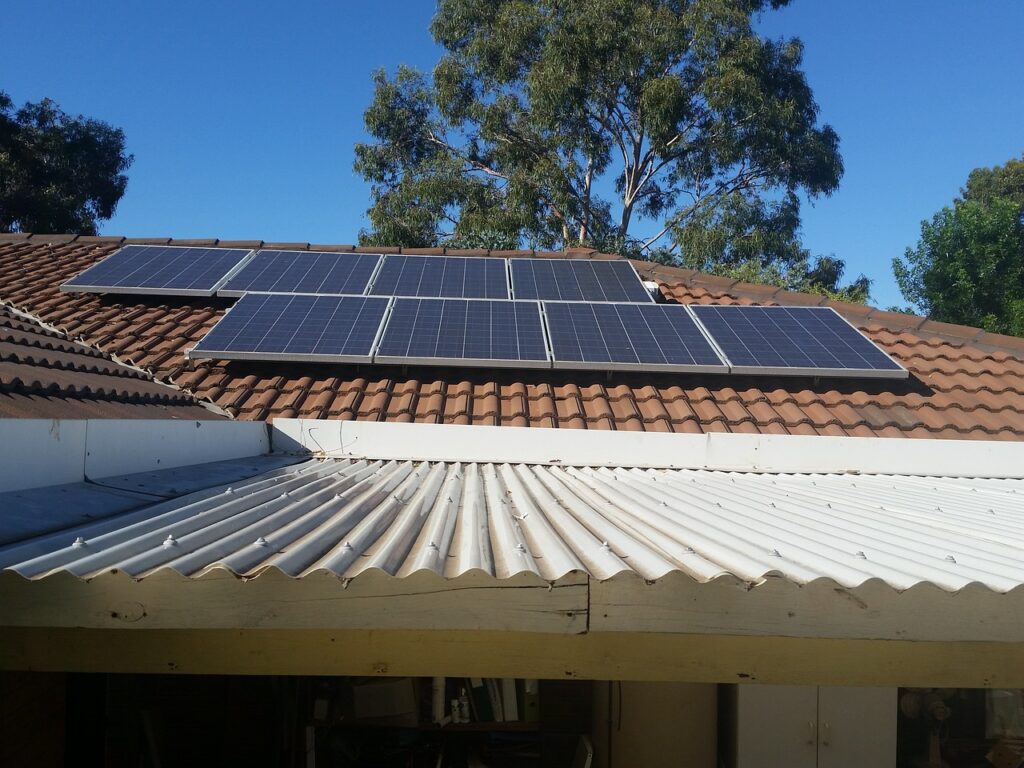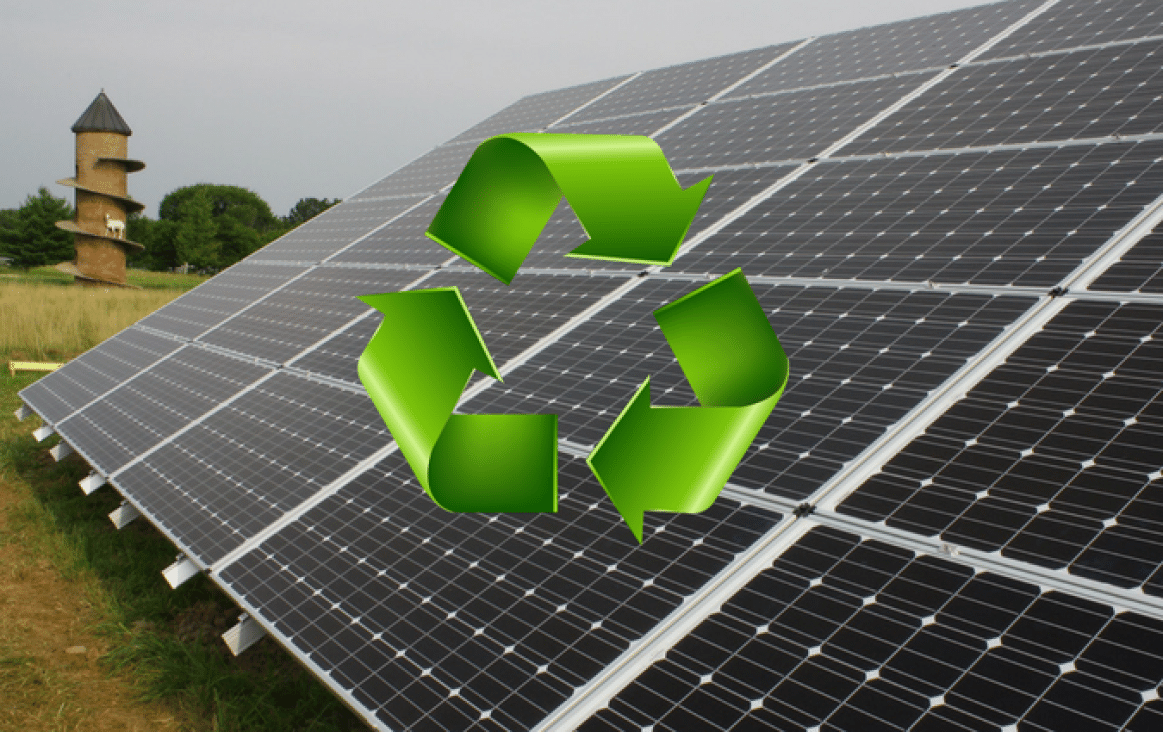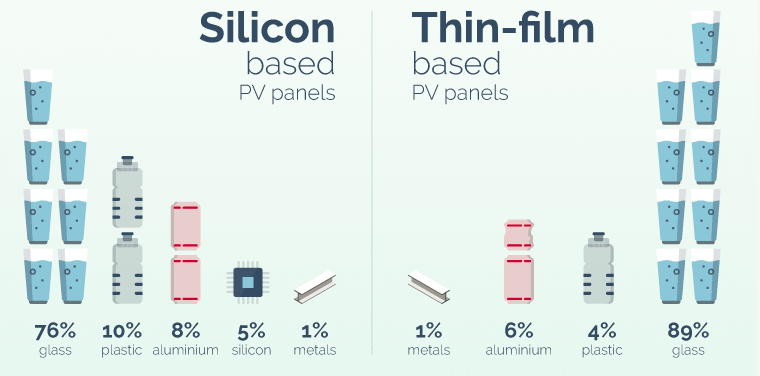Yes, solar panels can be recycled, as they are made up of materials like glass, aluminum, and silicon which can be recycled. The recycling process involves dismantling the panels, separating the components, and then melting them down to reuse the materials.

The growth of the solar industry has boosted the need for proper disposal and recycling, and as a result, many companies now offer recycling programs for solar panels. This has led to the development of more efficient and sustainable recycling techniques, which are crucial for reducing the environmental impact of solar panel waste.
We will explore the recycling process of solar panels and the importance of sustainable disposal methods for these renewable energy components.

Credit: www.greentechrenewables.com
The Importance Of Solar Panel Recycling
Solar panel recycling is vital for reducing environmental impact. Recycling helps recover valuable materials and reduces waste. Sustainable practices ensure a brighter future for renewable energy.
Solar panel recycling plays a crucial role in reducing waste in the solar industry and minimizing the environmental impact of solar panel waste. With the increasing adoption of solar energy as a sustainable power source, it is essential to address the end-of-life management of solar panels. This article will explore the importance of solar panel recycling, focusing on the reduction of waste in the solar industry and the environmental effects of solar panel waste.
Reducing Waste In Solar Industry
Recycling solar panels is imperative for reducing waste in the solar industry. As the demand for renewable energy continues to grow, so does the number of solar panels being manufactured and installed. Without proper recycling processes in place, these panels may end up in landfills, contributing to the accumulation of electronic waste.
Solar panel recycling helps in reducing waste by:
- Diverting used panels from landfills
- Recovering valuable materials for reuse
- Reducing the demand for raw materials
- Lowering energy consumption in the manufacturing process
By recycling solar panels, we can extend their lifespan and extract valuable materials such as silicon, glass, and metals. These materials can then be used in the production of new solar panels, reducing the need for virgin resources and the environmental impact associated with their extraction.
Environmental Impact Of Solar Panel Waste
The environmental impact of solar panel waste is a significant concern, considering the rapid growth of the solar industry. If not properly managed, decommissioned solar panels can release hazardous substances, contaminate soil and water sources, and contribute to greenhouse gas emissions during their decomposition.
Table:
| Environmental Impact of Solar Panel Waste: |
|---|
| Potential release of toxic substances |
| Soil and water contamination |
| Contributing to greenhouse gas emissions |
Proper recycling practices address these concerns by ensuring the safe handling and disposal of these materials. The recycling process involves carefully removing and separating the various components of a solar panel, such as glass, aluminum, and silicon. These materials can then be sent for reprocessing, minimizing the environmental impact of solar panel waste.
Benefits of solar panel recycling:
- Reduces the release of toxic substances
- Prevents contamination of soil and water sources
- Minimizes greenhouse gas emissions
- Preserves natural resources
- Promotes a circular economy
In conclusion, the importance of solar panel recycling cannot be overstated. It allows us to reduce waste in the solar industry, recover valuable materials, and mitigate the environmental impact of solar panel waste. By implementing proper recycling practices, we can ensure a sustainable future for solar energy and contribute to a cleaner and healthier planet.

Credit: www.greentechrenewables.com
What Makes Solar Panels Recyclable
Solar panels are a crucial component of the renewable energy landscape. One of the key aspects that make them environmentally friendly is the fact that they can be recycled. Understanding what makes solar panels recyclable is essential for ensuring sustainable practices in the solar industry.
Materials Used In Solar Panels
Solar panels are primarily made of materials such as silicon, glass, aluminum, and various polymers. Silicon is the key semiconductor material used in solar cells, while glass provides a protective layer. Aluminum frames and back sheets are also commonly used.
Components And Their Recyclability
Several components within solar panels can be recycled to a large extent. Silicon wafers, which are the key components for converting sunlight into electricity, can be reprocessed. Additionally, the glass and aluminum components can also be recycled effectively.
Challenges In Solar Panel Recycling
Solar panel recycling presents a unique set of challenges, posing obstacles to the sustainable disposal and reuse of these energy-efficient devices. From the complexity of their composition to the lack of adequate recycling infrastructure, the process of recycling solar panels is not without its difficulties. By understanding and addressing these challenges, the industry can work towards a more sustainable and environmentally friendly approach to solar panel disposal and reuse.
Complexity Of Solar Panel Composition
Solar panels are intricate devices comprised of various materials, such as silicon, glass, aluminum, and copper. The complex composition of these panels makes it difficult to efficiently and effectively disassemble and recycle them. Furthermore, the integration of different layers and components within the panels adds to the intricacy of the recycling process. This complexity poses a significant challenge in developing streamlined recycling methods for solar panels.
Lack Of Infrastructure And Recycling Facilities
The lack of adequate infrastructure and recycling facilities dedicated to solar panels is a significant challenge in the recycling process. Currently, there is a shortage of specialized facilities equipped to handle the recycling of solar panels. This lack of infrastructure creates barriers to the efficient and cost-effective disposal of solar panels, leading to potential environmental repercussions. Without accessible recycling facilities, the proper disposal and reuse of solar panels become more challenging, hindering the establishment of a sustainable recycling system for these devices.

Credit: ae-solar.com
Current State Of Solar Panel Recycling
The current state of solar panel recycling is advancing, with the potential to recycle almost all components of solar panels, including glass, aluminum, and silicon. There is a growing emphasis on implementing efficient recycling processes to minimize environmental impact and make solar energy even more sustainable.
Solar panels have experienced a surge in popularity as a sustainable energy solution in recent years, with their installation numbers increasing rapidly across the globe. However, as solar panels reach the end of their lifespan, the question arises – can solar panels be recycled? Let’s explore the current state of solar panel recycling and the efforts being made in this field.
Regulations And Policy Initiatives
Recognizing the need to address the growing issue of solar panel waste, several regulations and policy initiatives have been implemented worldwide to encourage and ensure proper recycling practices. Governments and regulatory bodies are playing a crucial role in promoting the recycling of solar panels to minimize environmental impacts.
- Some countries have introduced legislation that requires solar panel manufacturers to bear the responsibility of recycling their products at the end of their life cycle.
- These regulations often include guidelines for collection, processing, and disposal of solar panels in an environmentally friendly manner.
- By enforcing these regulations, governments aim to create a framework that holds manufacturers accountable for the entire lifecycle of their solar panels, including the recycling phase.
Leading Companies And Initiatives
Within the solar industry, numerous companies and initiatives have emerged to address the growing demand for the proper recycling of solar panels. These entities are actively working towards minimizing the environmental impact associated with decommissioned panels.
1. Solar Energy Industries Association (SEIA)
SEIA is a prominent organization that promotes solar energy and advocates for sustainable practices within the industry. They actively support initiatives related to solar panel recycling and collaborate with various stakeholders to develop effective strategies for responsible disposal.
2. PV CYCLE
PV CYCLE is an industry-led, non-profit organization committed to the recycling and proper treatment of photovoltaic panels. They provide a transparent and reliable system for collecting and recycling solar panels, ensuring compliance with regulations and high environmental standards.
3. Leading Solar Panel Manufacturers
Many solar panel manufacturers have taken the proactive step of establishing their recycling programs or partnering with specialized recyclers. These initiatives aim to streamline the recycling process and extract valuable materials from decommissioned panels, ultimately reducing the reliance on new raw materials.
| Company | Recycling Initiatives |
|---|---|
| SunPower | SunPower has implemented a comprehensive recycling program to recover as many materials as possible from worn-out solar panels. They prioritize the reuse of valuable components and work towards a circular economy. |
| JinkoSolar | JinkoSolar collaborates with specialized recyclers to ensure responsible management of their products. They aim to reduce the environmental impacts of manufacturing and improve the sustainability of the entire supply chain. |
In conclusion, the current state of solar panel recycling involves a concerted effort from governments, organizations, and solar panel manufacturers to establish policies, regulations, and initiatives that support environmentally responsible practices. By working together, we can ensure that solar panels have a minimal ecological footprint throughout their lifecycle.
Technologies And Processes In Solar Panel Recycling
Solar panels can indeed be recycled using various technologies and processes. Recycling helps recover valuable materials and reduces environmental impact, making it a sustainable solution for managing solar panel waste.
Solar panels are a popular and environmentally friendly way to generate electricity. However, with the advancement of technology and the increasing demand for renewable energy, the question arises: Can solar panels be recycled? The answer is yes! Recycling solar panels not only helps to reduce waste and conserve resources but also plays a crucial role in the sustainability of the solar industry. In this blog post, we will explore the technologies and processes involved in solar panel recycling, specifically focusing on mechanical and chemical processes.
Mechanical Processes
Mechanical processes play a vital role in the recycling of solar panels. The first step in this process is the dismantling of the panels to separate the different components. The dismantling can be done manually or with the help of automated machines. Once the dismantling is complete, the various components such as the glass, aluminum frame, silicon cells, and junction box can be separated.
One method of mechanical recycling is called shredding. Shredding is a process where the solar panels are broken down into smaller pieces using specialized equipment. The shredded pieces are then sorted based on their material composition using techniques like air classification and magnetic separation. These processes help in segregating materials such as glass, silicon, and metal, which can be recycled separately.
Another mechanical process commonly used is called thermal processing. Thermal processing involves subjecting the solar panels to high temperatures to decompose the organic materials and separate them from the inorganic components. This process is particularly effective in reclaiming the silicon wafers used in solar cells.
Chemical Processes
Chemical processes also play a crucial role in the recycling of solar panels. One common technique is chemical etching. This process involves the use of chemicals to dissolve the silicon or metal in the solar panels. The resulting solution can then be further processed to recover valuable materials.
Hydrometallurgical processes are another chemical method used in solar panel recycling. In these processes, the panels are first subjected to a series of chemical treatments to extract valuable metals such as silver, copper, and indium. The recovered metals can then be purified and reused in the production of new solar panels.
It is worth mentioning that not all solar panels can be recycled using the same technology and processes. The recycling methods may vary depending on the type and age of the panels. Additionally, the efficiency of the recycling processes is continually improving as new technologies and techniques are developed.
In conclusion, the recycling of solar panels is crucial for the sustainability of the solar industry. Mechanical processes, such as shredding and thermal processing, as well as chemical processes like chemical etching and hydrometallurgical processes, are used to recycle solar panels effectively. By recycling solar panels, we can reduce waste, conserve resources, and contribute to a cleaner and greener future.
Benefits Of Recycling Solar Panels
Solar panels are a popular choice for generating clean and renewable energy. However, just like any other electronic device, solar panels have a lifespan, and eventually, they need to be replaced. But what happens to these old solar panels? Can solar panels be recycled? The answer is a resounding yes! Recycling solar panels is not only possible but also beneficial for several reasons.
Resource Conservation
Recycling solar panels helps conserve valuable resources, as they contain materials that can be reused and repurposed. Solar panels consist of various components, including silicon wafers, metals, and glass. By recycling these materials, we can reduce the need for mining and extraction of new resources, which in turn helps to preserve our natural environment.
Reduction In Environmental Pollution
When solar panels reach the end of their life, they might end up in landfills, contributing to environmental pollution. However, by recycling solar panels, we can minimize this impact. Recycling helps prevent the release of harmful toxins and pollutants present in solar panels, such as lead and cadmium. Proper recycling processes ensure that these hazardous substances are safely extracted and disposed of, reducing the risk of contamination.
Moreover, recycling solar panels also reduces the potential for pollution associated with the manufacturing of new panels. The energy-intensive production of solar panels involves various chemical processes and emissions. By reusing and recycling existing panels, the overall demand for new manufacturing can be reduced, resulting in a lower carbon footprint and less pollution generated.
Future Prospects And Innovations In Solar Panel Recycling
Solar panel recycling is gaining prominence as the future solution to managing end-of-life solar panels. Innovations in the field are focused on efficient extraction of valuable materials and reducing environmental impact, ensuring a sustainable future for solar energy.
Advancements In Recycling Techniques
Solar panel recycling has come a long way in recent decades, thanks to groundbreaking advancements in recycling techniques. These innovations have paved the way for more efficient and eco-friendly methods of handling end-of-life solar panels.
One notable advancement is the development of robotic technology for dismantling and separating solar panel components. Robots can now efficiently disassemble panels, separating the glass, aluminum, silicon, and other valuable materials for recycling. This automated process not only reduces the labor-intensive nature of recycling but also minimizes the potential for human error.
Another significant breakthrough is the implementation of innovative extraction methods for valuable materials like silver and silicon. These methods employ advanced technologies such as hydrometallurgical and pyrometallurgical processes to extract useful metals and materials from solar panels. This ensures that valuable resources are not wasted and can be reused in the production of new solar panels.
In addition to advancements in recycling techniques, there are several emerging trends and technologies that hold promise for the future of solar panel recycling. These developments aim to make the entire recycling process even more efficient and sustainable.
One such trend is the integration of artificial intelligence (AI) and machine learning into recycling systems. AI algorithms can analyze and sort solar panels based on their materials and condition, allowing for more accurate and streamlined recycling processes. This not only speeds up the recycling process but also reduces the risk of improper handling, maximizing resource recovery.
Unordered List:
Furthermore, customized recycling solutions for different types of solar panels and materials are emerging, taking into account the unique composition of each panel. By tailoring the recycling process to specific panel types, it becomes possible to recover a greater percentage of valuable materials while minimizing waste.
The implementation of circular economy principles within the solar industry is another promising development. This approach emphasizes the importance of designing products with the intention of recycling and reusing their components at the end of their lifecycle. By incorporating circularity into solar panel manufacturing, the industry can greatly reduce its environmental impact while ensuring a sustainable supply chain.
Additionally, efforts are being made to develop innovative techniques for recovering rare earth metals used in solar panels. These metals, such as indium and tellurium, are essential for the production of high-efficiency panels. By finding efficient ways to extract and reuse these valuable resources, the industry can become less reliant on virgin materials and create a more sustainable solar energy ecosystem.
Overall, the future of solar panel recycling looks promising as advancements in recycling techniques and emerging trends and technologies continue to improve the industry’s efficiency, resource recovery, and sustainability. With further innovation and widespread adoption of these practices, we can mitigate the environmental impacts of solar panel waste and pave the way for a greener energy future.
Frequently Asked Questions Of Can Solar Panel Be Recycled
Can Solar Panels Be Recycled?
Yes, solar panels can be recycled through specialized recycling facilities. Recycling helps recover valuable materials and reduces environmental impact.
What Happens To Solar Panels At The End Of Their Life?
At the end of their life, solar panels can either be recycled or disposed of in landfills. Recycling is the more sustainable option as it allows for the recovery of valuable materials.
Why Is It Important To Recycle Solar Panels?
Recycling solar panels is important because it reduces waste and environmental impact. It also allows for the recovery of valuable materials, such as silicon and silver, which can be used for future panel production.
Conclusion
Solar panels can indeed be recycled, offering a sustainable solution to their end-of-life disposal. The recycling process involves recovering valuable materials and reducing environmental impact. By recycling solar panels, we can contribute to the preservation of natural resources and the reduction of electronic waste.
Recycling these panels is not only beneficial for the environment but also for the solar industry as it promotes a circular economy. Embracing solar panel recycling is a crucial step towards a greener future.